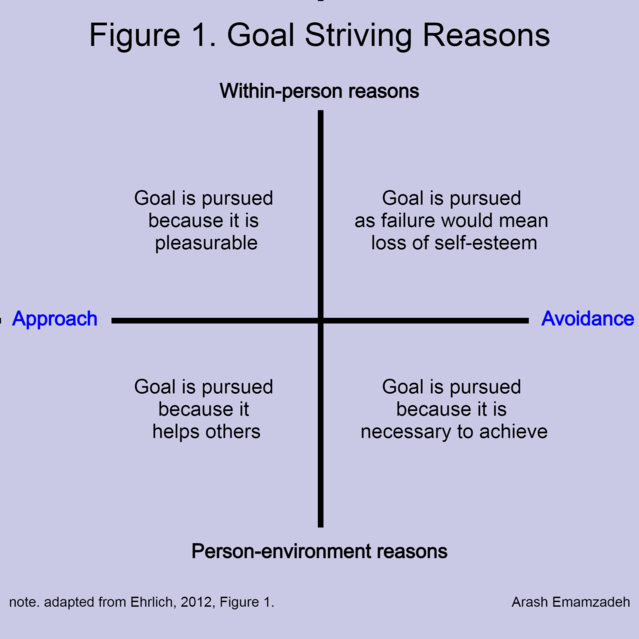KEY POINTS-
- People pursue goals for a variety of reasons (e.g., for pleasure, altruism, to prevent loss of self-esteem).
- Happiness is associated with pursuing goals for internal and approach-driven reasons (e.g., altruism).
- "Happiness Through Goal-Setting Training" improves reasons for goal pursuit, positively impacting functioning.
Published in Psychological Reports, a recent study by C. Ehrlich suggests, “Happiness Through Goal-Setting Training significantly improves the quality of people’s reasons for goal pursuit.” In addition, it improves their psychological functioning—through reduced negative affect and increased life satisfaction, positive affect, and work engagement.
Goal-Striving Reasons
The goal-striving reasons framework divides people’s reasons for goal pursuit along two dimensions: Internal/external and approach/avoidance. The four goal-striving reasons are (see Figure 1):
- To avoid self-esteem loss (e.g., avoid feeling like a failure or incompetent)
- For altruistic reasons (e.g., assisting, validating, or supporting others)
- For pleasure (e.g., experiencing joy, satisfaction, and well-being)
- Out of necessity (e.g., avoiding threatening or harmful situations, such as homelessness)

Because internal and approach goal reasons are associated with greater happiness and well-being, the purpose of an intervention called "Happiness Through Goal-Setting Training" is to help people pursue their goals more for reasons of pleasure and altruism and less for necessity or fear of losing their self-esteem.
C. Ehrlich, of Oxford Brookes University, evaluated this training, as described below.
Investigating the Effects of "Happiness through Goal-Setting Training"
Sample: 81; average age of 43 years old; 40 (87% female) completed the online version and 41 (80% female) the face-to-face version of the Happiness Through Goal-Setting Training.
Measures
- Goal-striving reasons: Assessed using the goal-striving reasons framework (i.e. pleasure, altruism, necessity, and self-esteem), and based on the most important self-selected goals.
- Cognitive subjective well-being: The Satisfaction with Life Scale (SWLS). For instance, “If I could live my life over, I would change almost nothing.”
- Affective subjective well-being: The short form of the Positive and Negative Affect Schedule (PANAS) scale. For example, participants reported to what degree they felt enthusiastic, sad, or depressed, in the last month.
- Work engagement: The short form of the Utrecht Work-Engagement Scale. A sample item is, “My job inspires me.”
Results
Happiness Through Goal-Setting Training improved people’s goal-striving reasons and had a positive effect on psychological functioning (e.g., positive emotions, life satisfaction, work-engagement). This was true for both the face-to-face workshop, which lasted one and a half days, or the six-weeks online program.
The effect sizes were in line with typical effect sizes of positive psychology interventions (ranging from 0.20 to 0.34).
Discussion
In general, one way to improve subjective well-being is by modifying the reasons for goal pursuit. For instance, by pursuing goals for more autonomous reasons, as opposed to external reasons like rewards or punishment.
In fact, choosing autonomous reasons also makes it easier to self-regulate. Similarly, respecting others’ autonomy enhances their self-confidence and intrinsic motivation to pursue goals related to well-being (e.g., weight loss).
In addition, it is best to pursue goals for internal and approach-driven reasons. This means that even if our goals are not pursued for autonomous reasons, we can still make the process enjoyable, satisfying, and meaningful.
As the author notes, the “quality of reasons behind people’s goal pursuits is an important predictor of positive psychological functioning.”
Four Ways To Increase Your Happiness
Let me end with a few suggestions on how to increase your happiness and well-being.
Please answer the following questions regarding your reasons for goal pursuit:

1. Self-esteem. To what extent are your primary goals in life related to a strong desire to self-validate, prove your self-worth, and protect your self-esteem?
Can you accept yourself even if you fail to achieve valued goals—e.g., stick to your diet, lose weight, get promoted, earn more money, own a house, get married, or master a musical instrument?
Take a moment to ponder if it is possible to change some of your performance goals to learning goals. In other words, aiming to improve your skills instead of seeking positive evaluation. In this way, a setback is no longer a failure and a sign that you are not good enough, but a reminder that you have not learned or practiced enough.
2. Pleasure. Positive emotions are associated with creativity, optimism, and resourcefulness. Indeed, they create an “upward spiral” toward greater happiness and well-being. So, to increase positive emotions, create a list of fun things you enjoy doing and do them regularly.
In addition, goal pursuit is often more pleasurable when linked with implicit motives (related to unconscious needs for power, affiliation, and achievement), as opposed to explicit motives (related to conscious beliefs, value system, self-image). So, align your goal pursuit more with implicit motives, with activities you find inherently interesting, absorbing, and satisfying.
3. Altruism. Helping others is not only among the most meaningful activities, it is also associated with greater happiness and well-being. One way to become more altruistic is by performing acts of kindness—e.g., pick up litter, feed a stranger’s parking meter, provide a meal to a homeless person, donate blood, or help someone with a difficult chore.
To increase your happiness, aim for variety rather than simply repeating the same acts. Furthermore, spend time reflecting on past acts of kindness.
And think about how your most valued goals affect others. Try to mentally reframe the purpose or significance of the goals to make them more meaningful—e.g., by considering their positive impact on people in your life, the community, society at large, or the environment.
4. Necessity. The last part of the training challenges the idea that wealth and possessions are absolutely necessary for happiness. Of course, some money is necessary but happiness depends on how the money is spent—whether for materialist reasons, or to satisfy basic needs (e.g., food, shelter), including psychological needs (e.g., autonomy, competence).
So, ask yourself, “How much money will make me happy? And to what extent are my greatest goals in life driven by the assumption that accumulating more wealth (e.g., to buy a larger house or nicer car) will significantly increase my happiness?”
Answering the above questions may help you to feel less stress, identify valued goals, refocus on non-materialistic reasons for goal pursuit, and set your own standards instead of obsessively comparing yourself with others.
And, it may help you to experience more happiness and satisfaction.



